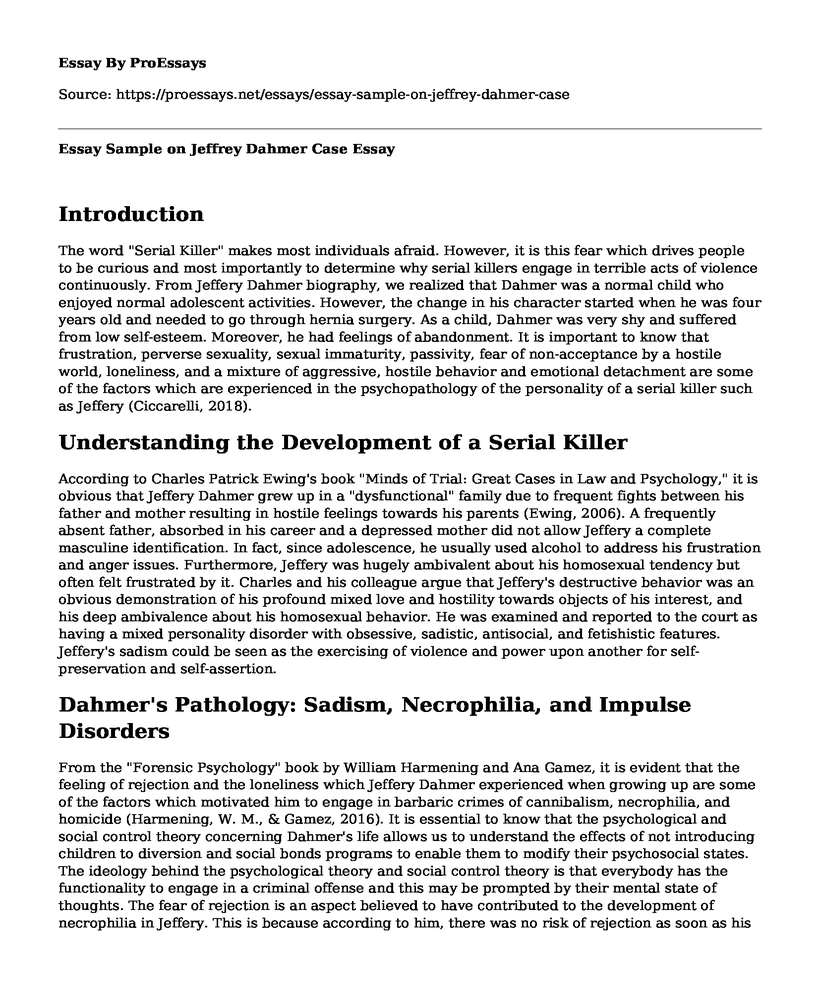Introduction
The word "Serial Killer" makes most individuals afraid. However, it is this fear which drives people to be curious and most importantly to determine why serial killers engage in terrible acts of violence continuously. From Jeffery Dahmer biography, we realized that Dahmer was a normal child who enjoyed normal adolescent activities. However, the change in his character started when he was four years old and needed to go through hernia surgery. As a child, Dahmer was very shy and suffered from low self-esteem. Moreover, he had feelings of abandonment. It is important to know that frustration, perverse sexuality, sexual immaturity, passivity, fear of non-acceptance by a hostile world, loneliness, and a mixture of aggressive, hostile behavior and emotional detachment are some of the factors which are experienced in the psychopathology of the personality of a serial killer such as Jeffery (Ciccarelli, 2018).
Understanding the Development of a Serial Killer
According to Charles Patrick Ewing's book "Minds of Trial: Great Cases in Law and Psychology," it is obvious that Jeffery Dahmer grew up in a "dysfunctional" family due to frequent fights between his father and mother resulting in hostile feelings towards his parents (Ewing, 2006). A frequently absent father, absorbed in his career and a depressed mother did not allow Jeffery a complete masculine identification. In fact, since adolescence, he usually used alcohol to address his frustration and anger issues. Furthermore, Jeffery was hugely ambivalent about his homosexual tendency but often felt frustrated by it. Charles and his colleague argue that Jeffery's destructive behavior was an obvious demonstration of his profound mixed love and hostility towards objects of his interest, and his deep ambivalence about his homosexual behavior. He was examined and reported to the court as having a mixed personality disorder with obsessive, sadistic, antisocial, and fetishistic features. Jeffery's sadism could be seen as the exercising of violence and power upon another for self-preservation and self-assertion.
Dahmer's Pathology: Sadism, Necrophilia, and Impulse Disorders
From the "Forensic Psychology" book by William Harmening and Ana Gamez, it is evident that the feeling of rejection and the loneliness which Jeffery Dahmer experienced when growing up are some of the factors which motivated him to engage in barbaric crimes of cannibalism, necrophilia, and homicide (Harmening, W. M., & Gamez, 2016). It is essential to know that the psychological and social control theory concerning Dahmer's life allows us to understand the effects of not introducing children to diversion and social bonds programs to enable them to modify their psychosocial states. The ideology behind the psychological theory and social control theory is that everybody has the functionality to engage in a criminal offense and this may be prompted by their mental state of thoughts. The fear of rejection is an aspect believed to have contributed to the development of necrophilia in Jeffery. This is because according to him, there was no risk of rejection as soon as his victims were dead. Behaviorally, Dahmer exhibited signs that could be linked to impulse disorder from his habit and desire to harm by murdering, drugging, dismembering his victims, and performing sexual acts on his dead victims.
Conclusion
Drawing conclusion from both books, it is obvious that the authors felt that Jeffery was suffering from deep disturbance of his inner persona. He was found to be legally sane, and I believe that the court made a correct and an official decision. Dahmer had compulsive hostile character, and his violence was extremely profound which caused him to cut, kill, dissect, and dismember his victims sadistically and obsessively. He wanted to destroy and torture the body that repelled and attracted him because he felt that by doing so he would be able to get rid of his unwanted attraction and mental, emotional torture.
References
Ciccarelli, S. K., & White, J. N. (2018). Psychology. Harlow, Essex: Pearson.
Ewing, C. P., & McCann, J. T. (2006). Minds on trial: great cases in law and psychology. Oxford:
Harmening, W. M., & Gamez, A. M. (2016). Forensic psychology. Boston: Pearson.
Cite this page
Essay Sample on Jeffrey Dahmer Case. (2022, Mar 31). Retrieved from https://proessays.net/essays/essay-sample-on-jeffrey-dahmer-case
If you are the original author of this essay and no longer wish to have it published on the ProEssays website, please click below to request its removal:
- Comprehensive Immigration Reform Law Essay
- Possession of a Firearm and Constitutional Rights Paper Example
- Death Penalty Methods Essay
- Essay Sample on Obama Care: Improving Lives of Millions in Texas
- Research Paper on Marijuana Legalization: Responsible Stewardship for University and Community Development
- Religious Organizations Divided on Death Penalty: Islam Maintains Compatible Position - Research Paper
- Political Considerations in Supreme Court Appointments - Free Paper Example







